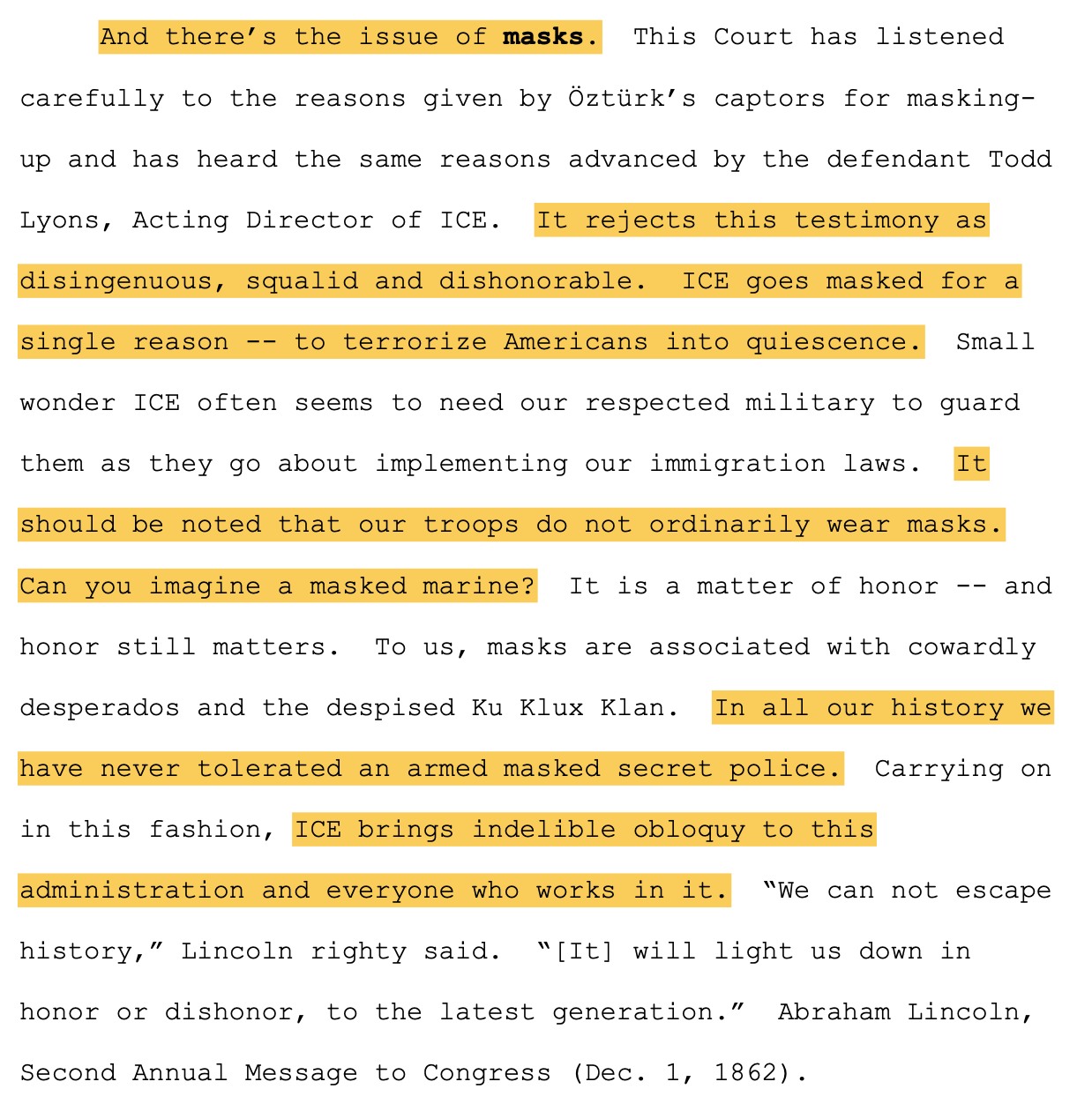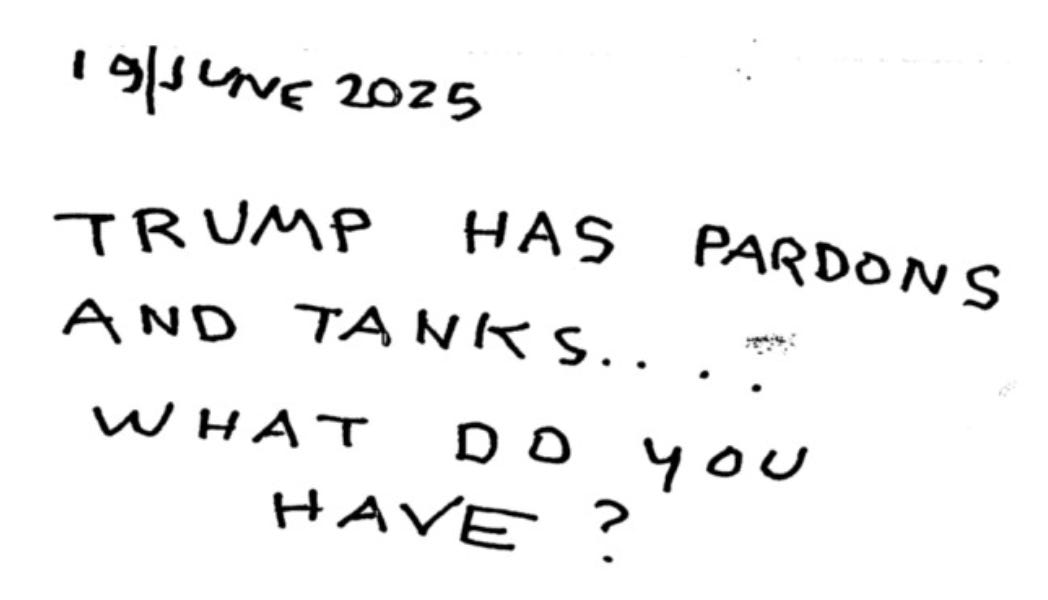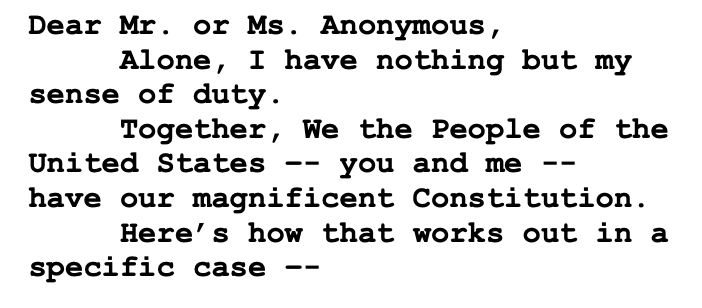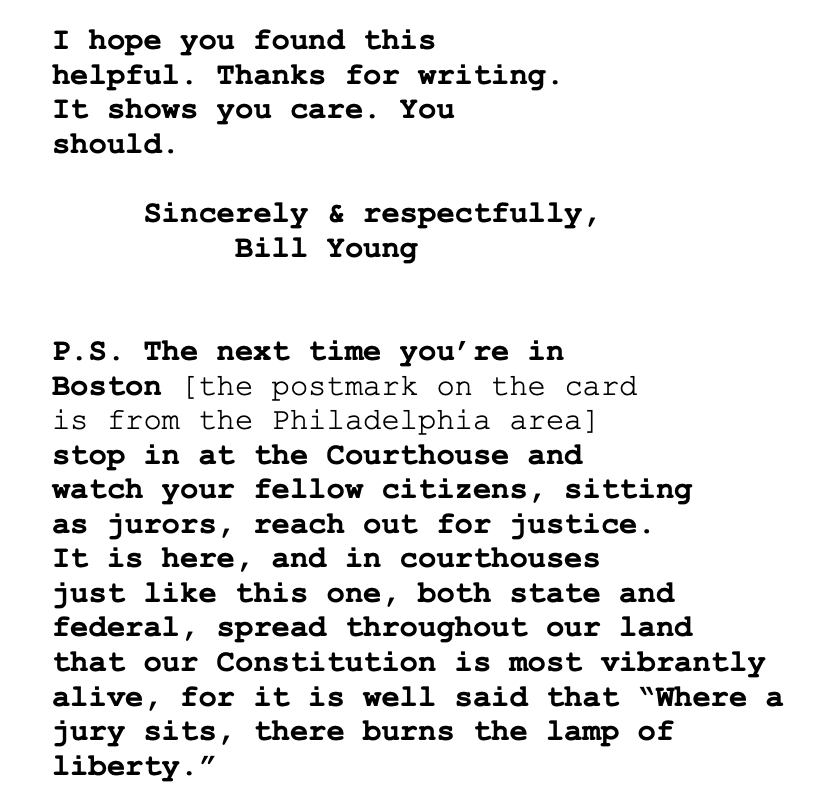Judge William Young's ruling against Rubio and Noem is a lesson for all in the Trump era
Young lays bare the unconstitutionality of the Trump administration's student deportation efforts — and issues a challenge to America. Also: More court pushback.
U.S. District Judge William Young ruled on Tuesday that Secretary of State Marco Rubio, Homeland Security Secretary Kristi Noem, and their respective departments had violated the First Amendment and federal law by “deliberately and with purposeful aforethought” acting “to chill the rights to freedom of speech and peacefully to assemble” of noncitizens.
Summing up his reading of history and condemnation of the actions of the current leadership of the executive branch, Young made clear that — regardless of what is happening elsewhere — he would hold true to what he sees as his role in our system.
“The only Constitutional rights upon which we can depend are those we extend to the weakest and most reviled among us,“ Young wrote in Tuesday’s 161-page ruling against the Trump administration.
An 85-year-old Reagan appointee, Young called the case “perhaps the most important ever to fall within the jurisdiction of this district court.” His decision setting forth his findings of fact and rulings of law — which was brought by the American Association of University Professors and Middle East Studies Association — more than bears that out.
Young does more in one decision than perhaps any public official has done this year to detail the specific methods President Donald Trump and the Trump administration use to act illegally and unconstitutionally, the many ways the other branches and outside institutions have capitulated to those acts, and the essential and powerful ways people — and the legal system — can push back.
It is, however, ultimately a challenge to America.
Young is aware — as he detailed in a 10-page section of his ruling explaining “Justice in the Trump Era” — that he and the U.S. District Court for the District of Massachusetts cannot hold the line. In a conclusion that first quoted Ronald Reagan’s 1967 statement that freedom is “never more than one generation away from extinction,” Young then wrote:
I fear President Trump believes the American people are so divided that today they will not stand up, fight for, and defend our most precious constitutional values so long as they are lulled into thinking their own personal interests are not affected.
Is he correct?
That fear and question might have felt forced or exaggerated for emphasis elsewhere, but, by time it was posed on page 160 of Young’s ruling, it was simply a statement from a judge who has been on the federal bench for 40 years, has been alive for more than double that time, is overseeing multiple cases addressing this administration’s actions, and is questioning what’s to come.
The bigger picture — as important as it is — should not eclipse the specific case in which Young was ruling on Tuesday. The decision, which followed an extensive trial, meticulously detailed — over 100 pages — the effort undertaken by the Trump administration to implement several Trump executive orders, including those aimed at addressing terrorism and antisemitism, by targeting students involved in protests for deportation.
If you have been following the administration’s actions, many of these steps are known and are being challenged in separate litigation — including the efforts to detain and deport Yunseo Chung, Mahmoud Khalil, Badar Khan Suri, Mohsen Mahdawi, and Rümeysa Öztürk. In the context of this lawsuit over the chill to the university organizations and their members, Young carefully combined that information with background, witness statements in court, and public statements by members of the administration — including, most damningly, Trump and Rubio — to make undeniable what has happened over this year.
Of the effort that has ensnared these people and others, Young wrote that the government witnesses who testified were “decent, credible, dedicated non-partisan professionals.” They are, he continued, “[t]rue patriots who, in order to do their duty, have been weaponized by their highest superiors to reach foregone conclusions for most ignoble ends.“
Of the acts that have taken place over the past nine months, Young wrote:
It was never the Secretaries’ immediate intention to deport all pro-Palestinian non-citizens for that obvious First Amendment violation, that could have raised a major outcry. Rather, the intent of the Secretaries was more invidious — to target a few for speaking out and then use the full rigor of the Immigration and Nationality Act (in ways it had never been used before) to have them publicly deported with the goal of tamping down pro-Palestinian student protests and terrorizing similarly situated non-citizen (and other) pro-Palestinians into silence because their views were unwelcome.
It was as obvious of a statement as it is an alarming one.
Young continued, focusing directly on Trump.
“[T]he President may not have authorized this operation (or even known about it), but once it was in play the President wholeheartedly supported it, making many individual case specific comments (some quite cruel) that demonstrate he has been fully briefed,” he wrote. “Such conduct, of course, violates his sacred oath to ‘faithfully execute the Office of President of the United States, and . . . to the best of [his] Ability, preserve, protect and defend the Constitution of the United States,’ … by ignoring the Constitution’s command that the President ‘take Care that the Laws be faithfully executed.’“
Then, however, Young showed that he had a broader scope — that he saw the full picture here — noting, “The fact that the President is, for all practical purposes, totally immune from any consequences for this conduct, Trump v. United States, 603 U.S. 593 (2024), does not relieve this Court of its duty to find the facts.”
In other words, “I see what you’ve done, Mr. Chief Justice, but I will still do my job.”
Throughout his opinion, Young focused in on several actions of this administration — allowing Rubio’s horrifying statements to speak for themselves, confronting America with a matter-of-fact description of what ICE is and how America’s immigration system operates, and damning the administration’s use of masks in its immigration enforcement.
From a March 27 news conference, Young quoted Rubio extensively, including the following:
I don’t care what movement you’re involved in. Why would any country in the world allow people to come and disrupt? We gave you a visa to come and study and get a degree, not to become a social activist that tears up our university campuses. …
I encourage every country to do that, by the way, because I think it’s crazy to invite students into your country that are coming onto your campus and destabilizing it. We’re just not going to have it.
Detailing the reality of ICE and immigration enforcement, Young wrote:
ICE has nothing whatever to do with criminal law enforcement and seeks to avoid the actual criminal courts at all costs. It is carrying a civil law mandate passed by our Congress and pressed to its furthest reach by the President. Even so, it drapes itself in the public’s understanding of the criminal law though its “warrants” are but unreviewed orders from an ICE superior and its “immigration courts” are not true courts at all but hearings before officers who cannot challenge the legal interpretations they are given.
Finally, as Young put it, “And there’s the issue of masks.“
Ultimately, Young ruled that the administration’s actions violate the First Amendment, as well as — on related grounds — the Administrative Procedure Act. In summing up part of the constitutional ruling, Young wrote:
[T]his Court rules that here the Plaintiffs have shown that Secretaries Noem and Rubio are engaged in a mode of enforcement leading to detaining, deporting, and revoking noncitizens’ visas solely on the basis of political speech, and with the intent of chilling such speech and that of others similarly situated. Such conduct is not only unconstitutional, but a thing virtually unknown to our constitutional tradition.
It was in describing what comes next that Young detailed what he called “Justice in the Trump Era.” The section and its warning is best summed up by one sentence.
“The President’s palpable misunderstanding that the government simply cannot seek retribution for speech he disdains poses a great threat to Americans’ freedom of speech,” Young wrote.
A remedy portion of the case will follow in short order. This is necessary, Young explained, because “it will not do simply to order the Public Officials to cease and desist in the future. The harm here and the deprivation suffered runs far deeper.”
In the midst of his expansive, extensive opinion, Young bookended the ruling by responding to the following post card he noted that he received earlier this year — likely sent in response to a ruling in a pair of cases relating to National Institutes of Health grants.
Printing the post card’s note at the top of the first page of the opinion — before the case caption even — Young wrote:
Returning to his anonymous questioner — sitting in, I would posit, for any American questioning whether standing up for our constitutional values is needed — Bill, as he signed the response, concluded:
After reporting for jury duty on Tuesday morning, reading that — and, truly, the rest of Young’s ruling — was fitting. As I waited at the H. Carl Moultrie Courthouse alongside more than 100 other prospective jurors from across D.C., Young and his staff likely were making the final edits to his ruling.
Although I ultimately wasn’t seated for a jury, the morning I spent at the courthouse — like Young’s opinion — was a reminder that each of us has a role to play to uphold justice in the Trump era.
Pushing back, ever so gently
U.S. District Judge William Young isn’t alone.
The courts can push back against Trump and his administration’s lawless and unconstitutional actions, when they want.
We have two exhibits from Wednesday morning — including one from the U.S. Supreme Court.
Along with that, the full U.S. Court of Appeals for the D.C. Circuit rejected the Trump administration’s request to let the administration’s attempt to fire the head of the copyright officer, Shira Perlmutter, take effect during litigation.
The court denied DOJ’s request that it reconsider — as a full court sitting en banc — a panel’s 2-1 decision enjoining the administration from enforcing the effort to replace Perlmutter.
No judge of the D.C. Circuit — none of the three Trump appointees, even — wrote anything regarding Wednesday’s order. It was not clear if any judge had even sought a vote on the request. If no judge seeks a vote on an en banc request, it is denied without a vote — and that is what appears to have happened here.







Quite a change: The lower courts speak truth … the highest deigns to disregard their findings of fact and law for undisclosed reasons.
Thank you and the Honorable William Young [ D. Mass.].